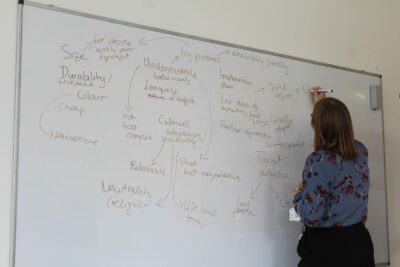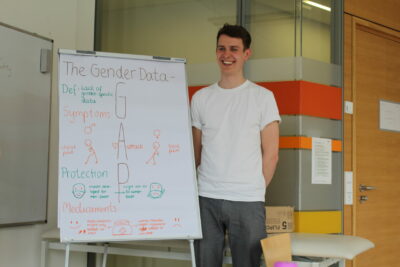

The scientific workshop “Health Literacy in Diverse International Contexts – A neglected but Highly Relevant Cross-cutting Issue That Supports Empowerment and the Effectiveness of Projects”, supported by the German Alliance of Global Health Research, took place at the Technical University Munich and online on Friday, April 22nd, 2022. The event was hosted by the Center for Global Health of the TU Munich in collaboration with the University of Education Freiburg (PH Freiburg), Charité – Universtitätsmedizin Berlin, School of Public Health of the Bielefeld University, and the Center for Global Health of the University of Oslo. A total of 92 people participated in the workshop, of which 20 participants were on-site.
The event began with a welcome speech by Prof. Dr. Dr. Andrea S. Winkler, director of the Center for Global Health. Following this, Prof. Dr. Orkan Okan of the TU Munich gave an insightful crash course about Health Literacy. The topic was then deepened by a keynote by Prof. Dr. Mohan Dutta of the Massey University, New Zealand. He highlighted a culture-centered community-led approach to Health Literacy.

Thereafter, two projects and the role of Health Literacy in it were presented. Rebecca Ingenhoff of the Charité Berlin presented her work in rural Uganda. Together with ACCESS Uganda, the goal is to strengthen Health Literacy through health education and disease prevention. The second project was presented by Millicent Ofori Boateng of the Ensign Global College, Kpong, Ghana, together with Stefanie Harsch-Oria of the University of Education Freiburg. They talked about Health Literacy adaption to different contexts and explained limitations and lessons learned.
After a short break, another two projects were presented. Christine Holst from NIPH/UiO Norway displayed her “Non-discriminating access for Digital Inclusion” innovation project. In collaboration with Tanzanian stakeholders and local end-users, a digital health platform was designed. The last project presentation was given by Hanna Luetke Lanfer of the Bielefeld University and Sorie I. Kargbo, an independent research assistant from Sierra Leone. They gave an example from a study on hand washing in Sierra Leone, presenting Health Literacy as a social practice.
The subsequent panel discussion on Health Literacy in Global Health took place with the following four international experts: Sri Handayanai (AHLA, Indonesia), Kenneth Yongabi Anchang (IMSU, Nigeria), Josef Noll (UiO, Norway), and Orkan Okan (TUM, Germany). They talked about their perspectives on Health Literacy and discussed how the global north could contribute to Health Literacy in the Global Health setting, especially in the global south. The panelists highlighted the importance of community engagement and examined how the global north can give local people of the global south voices. At the end of the discussion, all panelists summarized their suggestions on how to move Global Health Literacy forward and gave tips for early career researchers.

In the afternoon, all online participants could choose between two workshops. The topics were “Digital Learning in Global Health Literacy” and “The Role of Culture and Language in Health Literacy” by Christine Holst and Stefanie Harsch-Oria. Everyone who was on-site had the possibility to participate in the workshop “Strengthening Health Literacy through Educational Tools” by Rebecca Ingenhoff. With these three workshops the participants could apply their knowledge and what they have learned from the presentations into practice.
The hybrid workshop brought together experts from different settings. Various perceptions about Health Literacy were presented, leading to academic exchange and discussion. The project presentations showed the effectiveness of Health Literacy projects and highlighted community empowerment. Early career researchers had the opportunity to get useful insights and tips for their projects.
Written by: Mara Scherner, Center for Global Health of the TU Munich